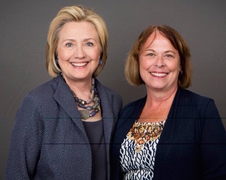 It’s the day after the US election, and like many, I’m trying to understand the surprising results, and what they mean for all of us. There are many dimensions to any political race, any contest between two humans. But the one I find myself thinking a lot about is likability. “Well, Hillary just isn’t likable." "Voters on the edge couldn’t vote for her because she isn’t likable.” How many times have I heard that? But what does it really mean? Two and a half years ago, when this picture was taken, I was lucky to attend a small education conference where Hillary Clinton spoke. She wasn’t yet a candidate for office, but she was close to declaring. On that day, with a tiny crowd, and an affable host and interviewer who was also her friend, Hillary was unguarded. We felt as if we were in her living room. She was funny, self-deprecating, and warm, and she was unbelievably smart, experienced, insightful and informed. That day, I think that everyone in the room (Democrats and Republicans, men and women) were blown away by her. We respected her AND we liked her. So, over the course of the past two years, I’ve often wondered, who is this other woman, this other Hillary we saw much more often on the campaign trail, the one who frowns so much when she speaks, who can seem stern and cold? What is it about her that makes people want to attack her and to hate her so deeply? Sure, there are political reasons, and legacy reasons, and age reasons. But I think a lot of it is about our discomfort with women in leadership. This comes in two waves: the discomfort women leaders have in being themselves instead of what is expected of them, and the discomfort that others have in watching them in action. Both have painful consequences. A lot has been written about women in leadership, but there’s a lot more to be written. Can a woman leader be both liked and respected? Can she be vulnerable? Can she be nurturing? As leaders, women often have to put on a defensive face in order to be seen as capable and strong. And then we are criticized for being inauthentic or calculating. Even now, there are very different standards applied to women and men leaders in all settings, when we observe the same behaviors. Here are some words we use: With Men/With Women: Shrewd/Shrew Warm/Weak Smart/Calculating Incisive/Cold Kind/Mother Hen Strong/Nasty Along with most women leaders, I’ve probably been called all of those words on the right hand side. It certainly hasn't been all bad; I’ve had a great career with plenty of support from women and men along the way. But I keep remembering back to one event that crystallizes a lot of the sexism I’ve seen over the years. I was lucky to be attending #CCL’s Leadership at the Peak, an immersive leadership training experience with only CEOs in attendance. We received 360 feedback, observed each other in action, worked intensively on the strategic challenges in our companies, and got to know each other really well. Towards the end of our week together, we were invited to give advice to each other. The comment I most remember was from a third generation President of a large family-run manufacturing company, a tall blond blue-eyed Nordic man with a kind twinkle in his eye. “You just don’t seem to be a CEO,” he said to me, “You’re much more like a wife. You’re nice, and you care about other people.” The rest of the CEO’s in the room (all men) nodded. The properly horrified facilitator quickly diverted attention elsewhere, and apologized to me in private later, assuring me that I had the chops to make tough decisions, and acknowledging that I had some hard times ahead. He was right; I did have many tough battles ahead, as a woman figuring out how to be myself and also the president of a growing organization. I don’t think those battles are getting any easier for many of us. On this day in particular, many of us are asking questions. “Will the hidden sexism in our society ever go away?” “What do I tell my daughters?” “Where are the role models for women?” “Do I dare to step up to leadership knowing that I might be savaged and hated?” “Or to urge my daughter to be a leader?” It’s an uneasy time, with no easy answers to those tough questions. As leaders, we need to find ways to be both ourselves and leaders, not to see those as contradictory roles. We need to keep finding the courage to step up and to take stances we believe in. For those of us who follow, the answer is to constantly question our assumptions and our innate prejudices. And for those of us who are parents, the answer is to teach our children well.
1 Comment
|
AuthorDebra Hunter gets much too excited about leadership and learning and the junction between the two. For 14 years, she was CEO of Jossey-Bass, publisher of top thought leaders in those areas. She's also a mom, photographer, and consultant. Archives
March 2021
Categories |

 RSS Feed
RSS Feed